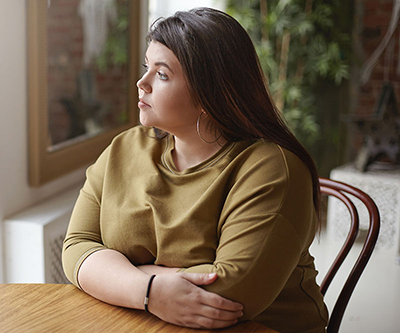
Adolescents, particularly girls, are vulnerable to social stressors. One theory proposes that loss-of-control eating—the experience of being unable to control what or how much one eats—results from unhealthy coping with social stress, such as being excluded or criticized by peers. Studies have suggested that girls with loss-of-control eating may have atypical brain responses to social threats.
- The Yanovski Lab applied a novel brain imaging tool called magnetoencephalography to extend this previous work. They examined links between brain activation in response to social threats and subsequent food intake among 34 adolescent girls with overweight or obesity. Study participants completed a task-based imaging scan in which they responded to images of angry, happy, or neutral faces. They were then offered a large meal.
- Imaging tests showed that girls who experienced loss-of-control eating had stronger responses to angry faces in the brain’s visual cortex, compared to girls without loss-of-control eating. Among all participants, socially threatening cues like an angry face elicited blunted responses in the left dlPFC, a brain region involved in executive control and regulation—the mental processes that enable people to plan, focus attention, remember, and handle multiple tasks. Relationships between these brain responses and caloric intake during the test meal were inconclusive.
- The findings suggest that girls with overweight or obesity may not productively engage the brain regions involved in executive processes. This difficulty may relate to behavioral patterns, such as loss-of-control eating, that can lead to excess weight gain.
NICHD authors of the paper include Meghan E. Byrne, Marian Tanofsky-Kraff, Megan N. Parker, Bess F. Bloomer, Sheila M. Brady, and Jack A. Yanovski.
Learn more about the Developmental Endocrinology, Metabolism, Genetics and Endocrine Oncology group: https://www.nichd.nih.gov/about/org/dir/affinity-groups/DEMG-EO
 BACK TO TOP
BACK TO TOP